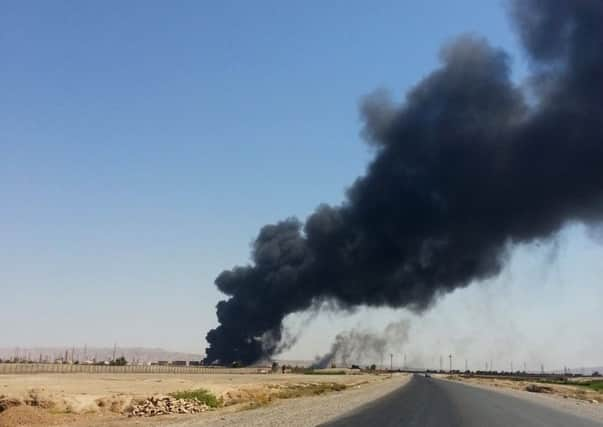Iraq: Battle to stop militants rages on


The two sides last night held different parts of the enormous Baiji facility, which extends over several square kilometres of desert. The facility, which was shut down, normally produces around 300,000 barrels per day, strictly for domestic consumption, and employs almost 16,000 workers.
The militants, led by Isis, clearly hope to get millions of pounds in revenue from operating the refinery – as they did for a while after seizing oil fields in neighbouring Syria.
Advertisement
Hide AdAdvertisement
Hide AdMore broadly, however, capturing the facility could weaken Prime Minister Nouri al-Maliki’s hold on power by calling into question his ability to stop the militants’ advance anywhere in Iraq.
The Baiji oil refinery, where Iraqi forces were battling the Isis militants, lies some 155 miles north of Baghdad. A witness who drove past the facility said the militants had manned checkpoints around it and hung their black banners on watchtowers.
Abu Anas, one of the militants laying siege to the refinery, told reporters the facility remained in government hands, saying helicopter gunships slowed the insurgents’ advance. Colonel Ali al-Qureishi, the army officer in charge of protecting the refinery, claimed it remained under his control. He said his forces had killed nearly 100 militants since Tuesday.
Photos showed the charred skeletons of destroyed army vehicles by a road that runs past. The photos also show US-made Humvees captured by the Isis militants flying the black banners. In the background, heavy black smoke rises from the refinery.
The plant’s production accounts for just over a quarter of the country’s entire refining capacity. It helped meet domestic consumption of petrol as well as fuel for cooking and power stations.
The petrol largely goes to northern Iraq, and the closure this week has already caused a shortage there. In Irbil, a city controlled by ethnic Kurds, queues stretched for miles at garages as angry motorists shouted at each other. Electricity also went off in some areas held by Isis.
It is not clear what the insurgents would do if they fully captured Baiji. In Syria, Isis has control of some smaller oil fields, but government air raids have limited their ability to profit from them for long. Militants have, however, refined oil into usable fuel products at primitive refineries.
The Isis campaign has raised the spectre of the sectarian warfare that nearly tore the country apart in 2006 and 2007, with the popular mobilisation to fight the insurgents taking an increasingly sectarian slant. Isis has vowed to march to Baghdad and the Shiite holy cities of Karbala and Najaf, home to some of the sect’s most revered shrines. The militants have also tried to capture Samarra, a city north of Baghdad and home to another major shrine. Yesterday, the bullet-riddled bodies of four handcuffed men, presumably Sunnis, were discovered in the Shiite Baghdad district of Abu Dashir. A roadside bomb hit a police patrol on a highway in the east of the city, killing two police officers and wounding two, police and hospital officials said.
SEE ALSO